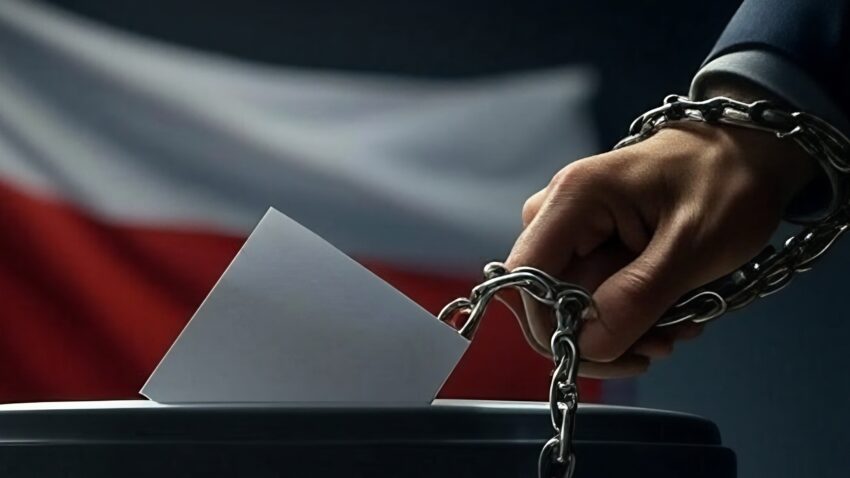The upcoming presidential election in Poland is already mired in controversy—not because of political rallies or televised debates, but due to what’s happening in the digital shadows. With traditional campaign posters notably absent, the internet has become the primary battlefield, and the weapon of choice? Sponsored political ads. The twist: these ads aren’t officially coming from any known campaign headquarters. Instead, they’re being pushed by mysterious websites that didn’t even exist two months ago.
Two Pages, Unlimited Budget, Zero Transparency
At the center of the controversy are two obscure Facebook pages: “Wiesz jak nie jest” and “Stół Dorosłych”. These accounts—unprofessional in appearance, allegedly grassroots in nature—have been spending eye-watering amounts of money, far surpassing official campaign budgets. Both were registered less than two months ago, in mid-March, and began operating precisely on April 10th, the anniversary of the Smolensk disaster. Their listed addresses are non-existent: one leads to… a swamp in Gdansk, the other to… a forest in Warsaw. They share the same fake phone number and have no physical office. Yet somehow, they wield enough financial muscle to flood Polish social media with highly targeted political content.
Smears and Praise: A One-Sided Message
The messaging from these pages is anything but neutral.
“Wiesz jak nie jest” focuses on vilifying conservative candidates like Karol Nawrocki—accused of shady underworld ties—and Sławomir Mentzen, portrayed as a dangerous radical who allegedly wants to dismantle the state and reduce women to child-bearing machines.
Meanwhile, “Stół Dorosłych” promotes Rafał Trzaskowski as the only stable, experienced choice. The tone is emotional, pseudo-civic, and allegedly spontaneous—featuring street interviews with “random citizens” voicing support for Trzaskowski. Only they aren’t random at all.
The “Passersby” Are Party Insiders
Investigative journalists quickly debunked the myth of these spontaneous testimonials. One man identified in a video is Piotr Ziegler, a known eco-activist and candidate affiliated with left-leaning parties. Another face resembles Krzysztof Korczak, an events industry entrepreneur with known ties to political circles. Far from being neutral observers, many of these “actors” are affiliated with pro-opposition groups or parties.
Who’s Pulling the Strings?
The rabbit hole goes deeper. The campaigns appear to be orchestrated by Jakub Kocjan, president of the “Akcja Demokracja” foundation, a left-leaning civic organization praised by Trzaskowski himself and previously supported by Donald Tusk. Kocjan was even awarded by Trzaskowski and has worked as a parliamentary assistant for a Civic Platform (PO) MP.
When confronted, Kocjan denied direct involvement, claiming his group merely connected a tech firm with “amateur actors.” That firm, it turns out, is registered in Vienna and owned by a former head of Hungarian secret services under a post-communist government. Yes, you read that right.
NASK and other State Institutions Join the Circus
The government’s cybersecurity agency, NASK, finally stepped in, but their findings raised more questions than answers. They vaguely warned of “potential foreign influence” and listed ads involving Trzaskowski, Nawrocki, and Mentzen—conveniently ignoring the fact that the former was exclusively promoted while the latter two were attacked. Facebook quickly pushed back, clarifying that the page administrators were verified Polish residents and that there was no evidence of foreign interference.
Ironically, Jakub Kocjan had previously served as a NASK expert, teaching how to fight disinformation. The watchdog now appears entangled in the very manipulation it’s supposed to prevent.
Trzaskowski’s Team Distances Itself—Sort Of
As the scandal gained traction, Trzaskowski’s campaign hurried to dissociate itself from the ads. “These campaigns are not ours,” they claimed in a statement to NASK and Meta, adding that they had no ties to the entities running the ads. Still, suspicions linger, especially as yet another “pro-voter turnout” campaign was traced to a foundation owned by a TV mogul whose wife happens to be employed by Trzaskowski.
The pattern is hard to ignore: the same ecosystem of allies, foundations, and media figures consistently appears behind ostensibly independent civic actions that, in practice, favor one side of the political spectrum.
The Bigger Danger: Voter Manipulation
The scandal raises serious questions about the integrity of the electoral process. Are Polish voters being manipulated by covert campaigns that bypass campaign finance laws? If shady money is influencing public opinion, where is law enforcement? Where is the oversight? If this is allowed to continue unchecked, the 2025 presidential election could be decided not by informed citizens, but by anonymous operators with deep pockets and questionable agendas.
This isn’t just a story about dirty tricks or one candidate’s advantage. It’s a cautionary tale about how democracy can be subverted from the inside—using the language of civic engagement and digital savvy to deceive, distract, and ultimately control the narrative. The mechanisms may be hidden, the names obscure, but the impact is very real. And in the fog of campaign warfare, the real loser may be public trust itself.
